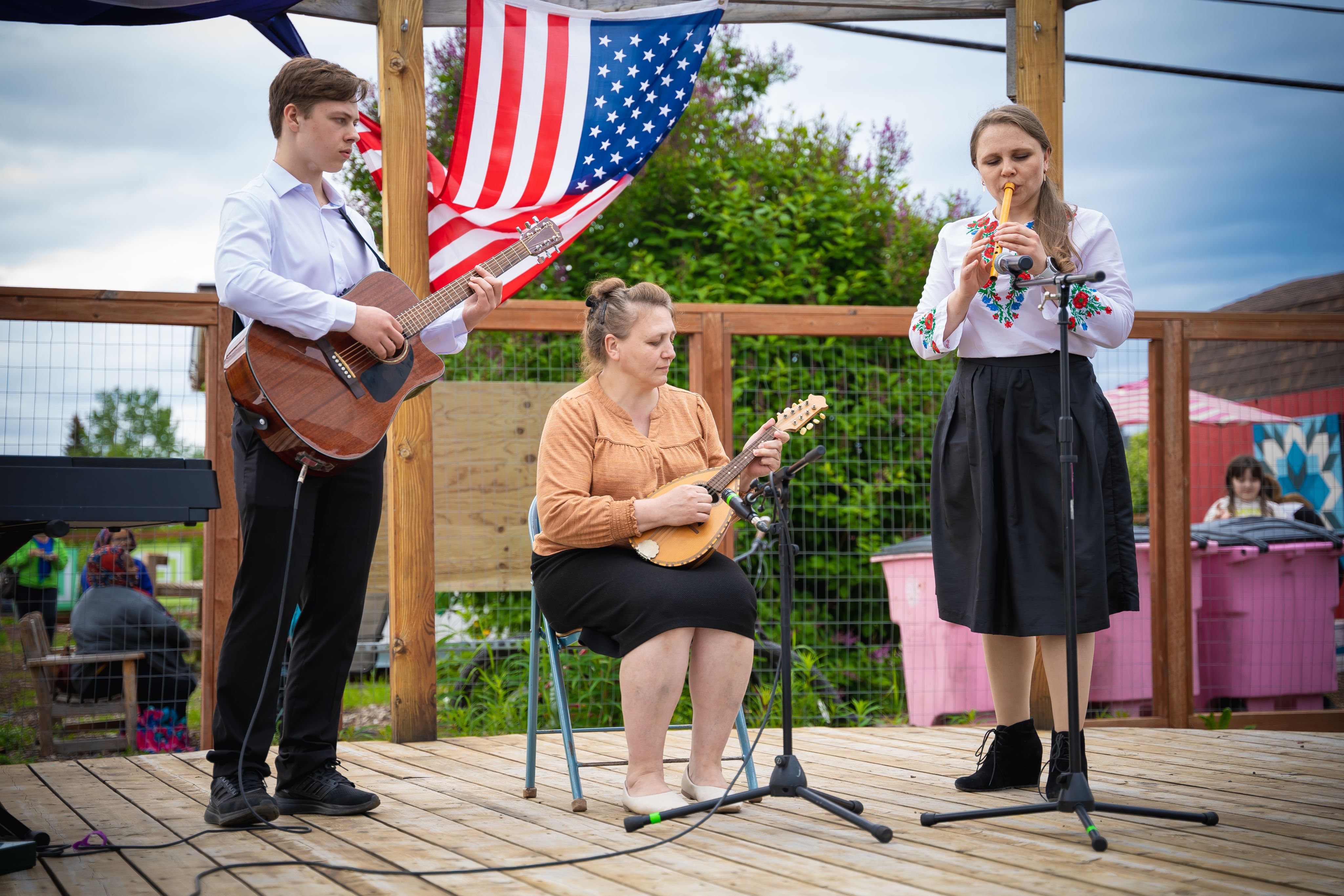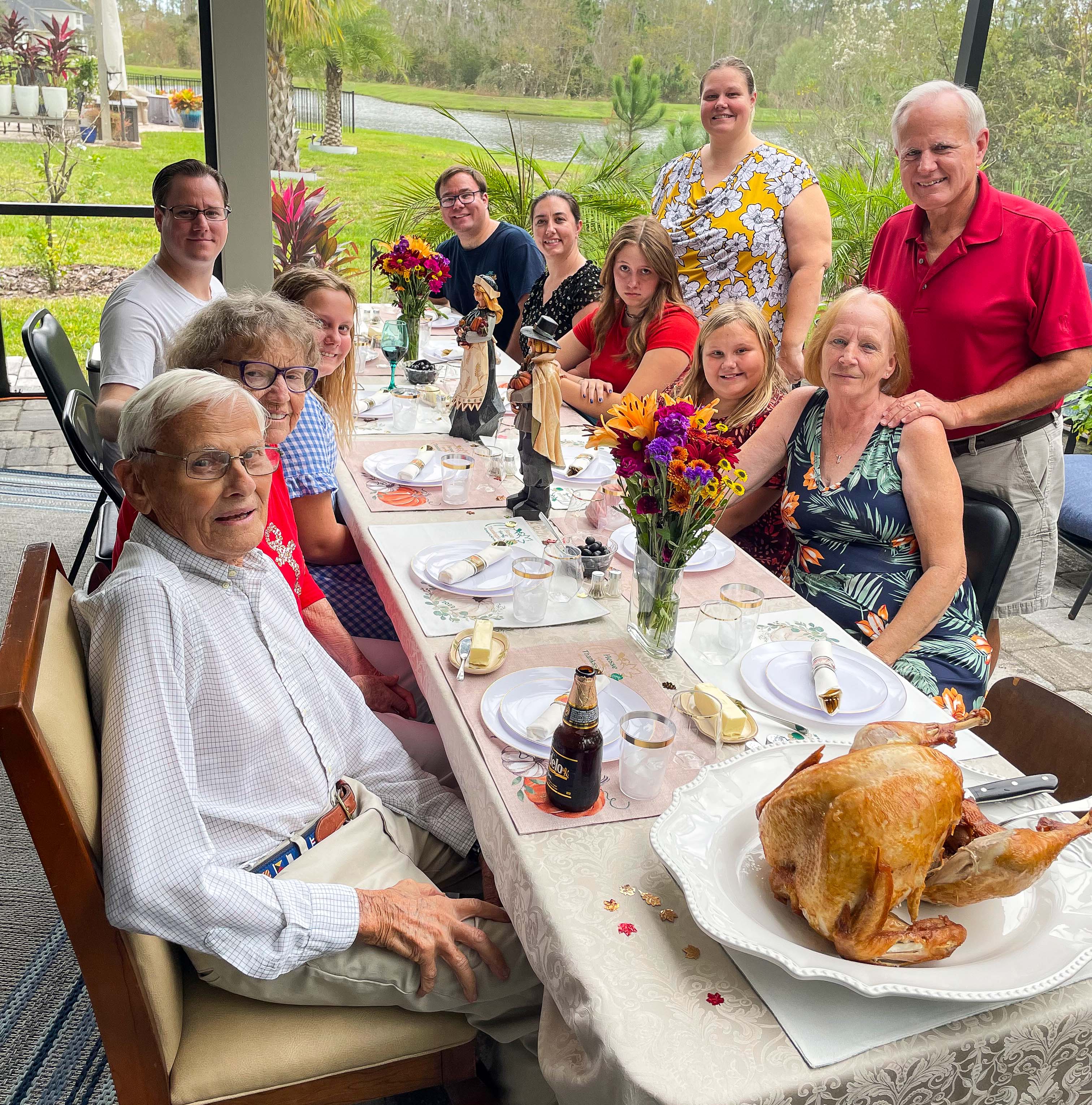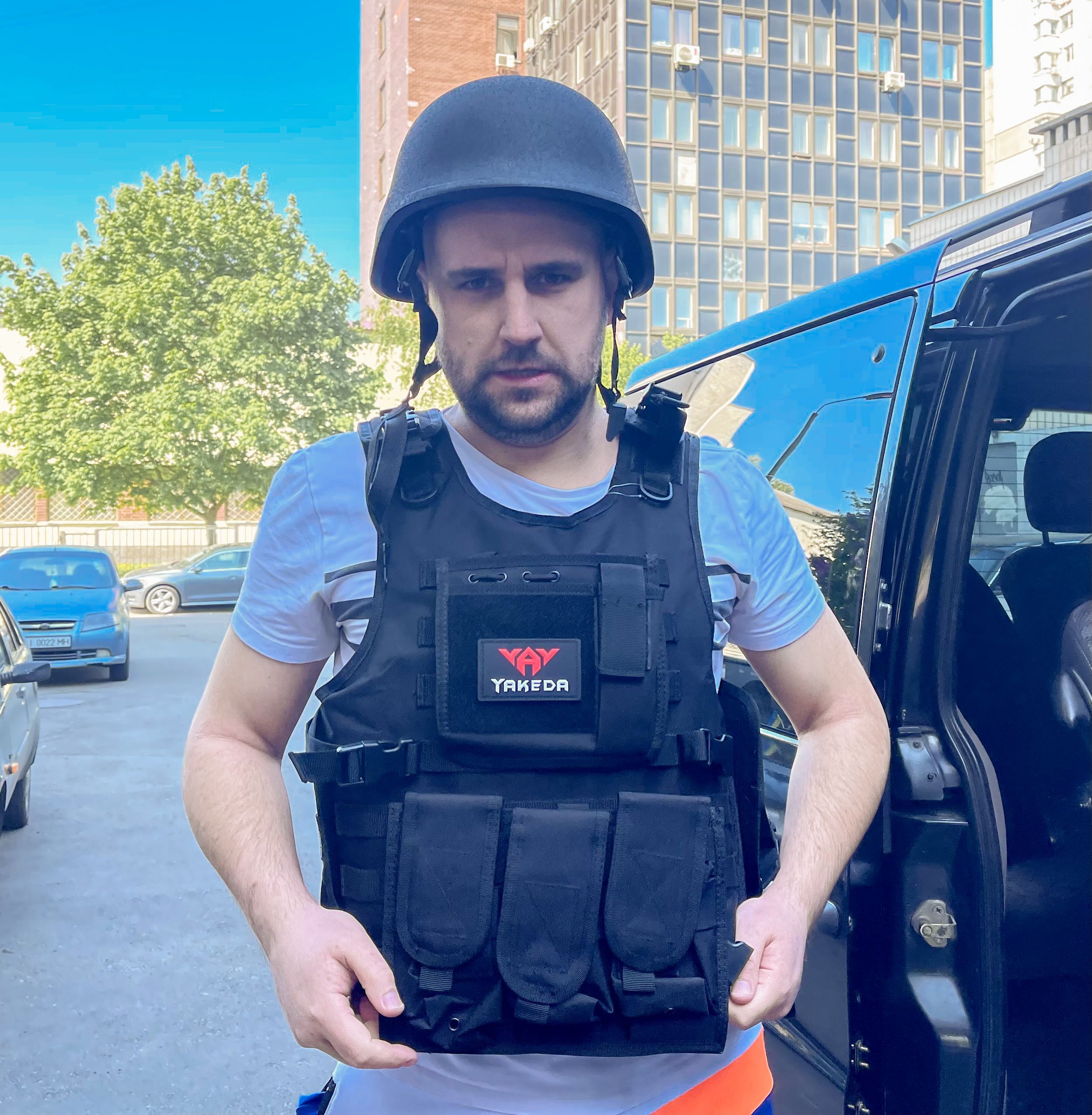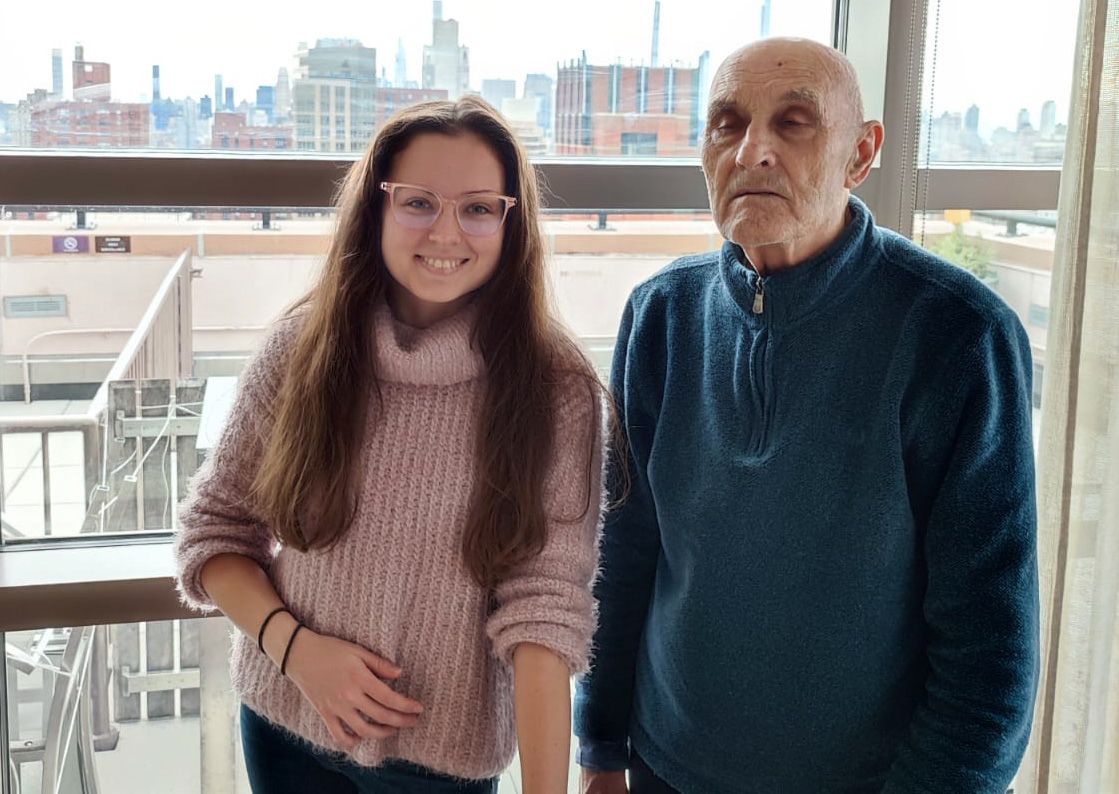FOR LOVE OF UKRAINE
In a time of war, time for new roots
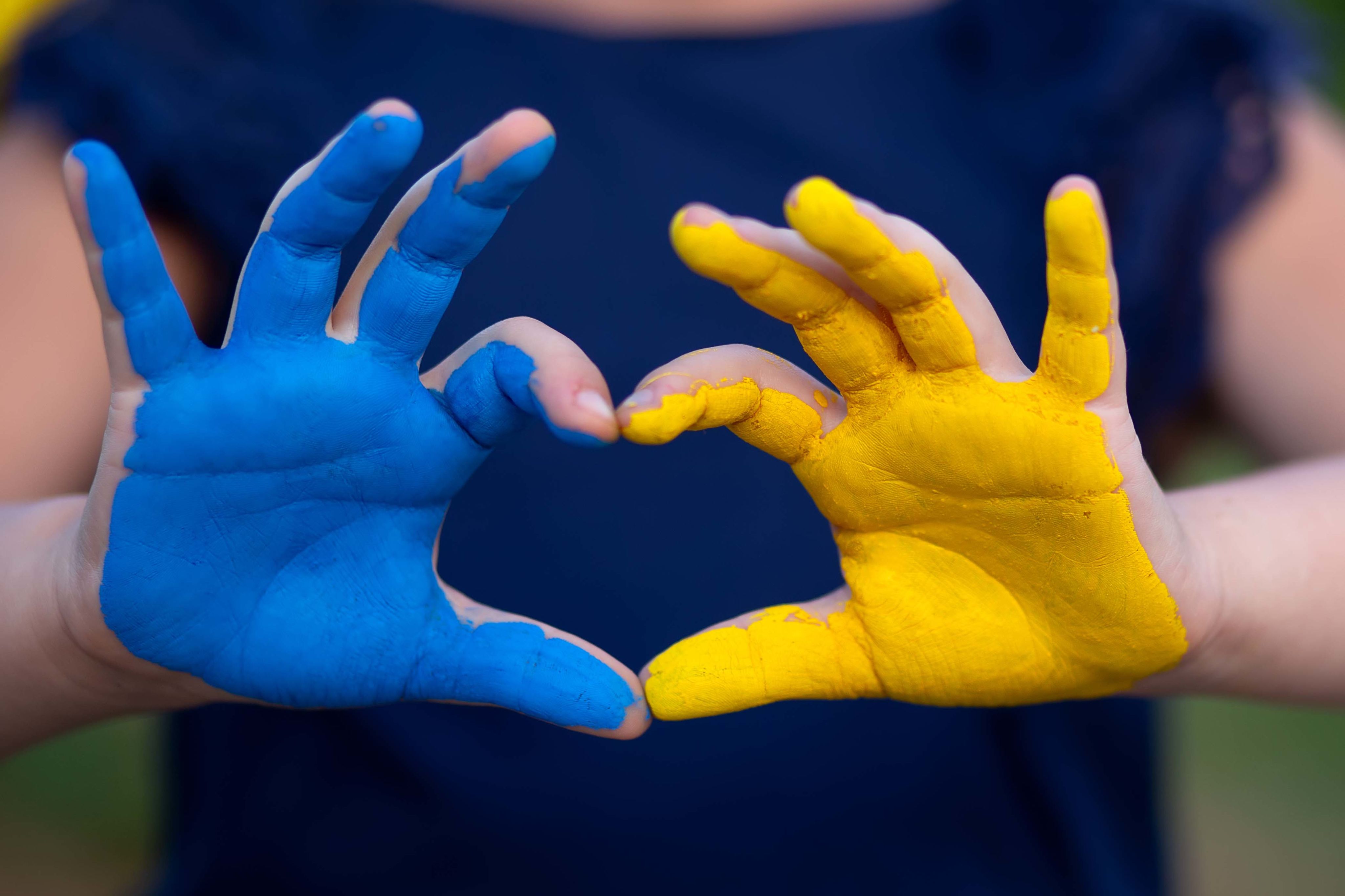
The day Russia began bombing Kyiv, in February 2022, Tamila and Mykola Vashchuk and their 6-year-old son Oleksandr (Sasha) were awakened by the sounds of explosions and sirens at 5 o’clock in the morning. A nearby house was hit by debris from a downed Russian missile. The streets filled with cars and dazed neighbors lugging hastily packed suitcases. Lines formed at gas stations.
Terrified, the family fled to a village in the countryside that was later occupied by Russian troops. With no idea what the future held, they traveled to Poland, then Iceland and then the United States, finally landing in Ohio, where extended family offered them significant help, for which they remain enormously grateful.
More than 15 months later, Mykola, a lawyer by training, is working for Catholic Charities Diocese of Cleveland, assisting Ukrainians and other recent arrivals with their immigration paperwork, and Tamila is volunteering with refugee families as a mentor for Catholic Charities. Sasha is in third grade, in the same class as a cousin.
Large populations of Ukrainians in Cleveland, New York City, Jacksonville and Anchorage have made those cities, and the Catholic Charities agencies that serve them, the most-frequent resettlement destinations in the network. When the federal government created the Uniting for Ukraine (U4U) program in April 2022 with a promise to welcome up to 100,000 Ukrainians, optimism was high among those who had fled their homeland that they would soon be able to return.
But as the war drags on with no end in sight, increasing numbers of the more than 270,000 Ukrainians who have landed in the U.S. are looking at making it a long-term relocation. They’ve found jobs, their children are in school and they’re making new connections in their communities or renewing old ones. They’re hopeful that Ukraine will prevail but uncertain when that will be.
In Cleveland, Mykola has received U4U parole, with the right to work and study, but Tamila and Sasha had to return to Ukraine briefly for a medical emergency, which impacted their immigration case. The two are scheduled for a court hearing on removal proceedings in August 2024 and their status is uncertain.
Meanwhile, the couple remains committed to doing what’s best for their son and to making a go of things in Ohio.
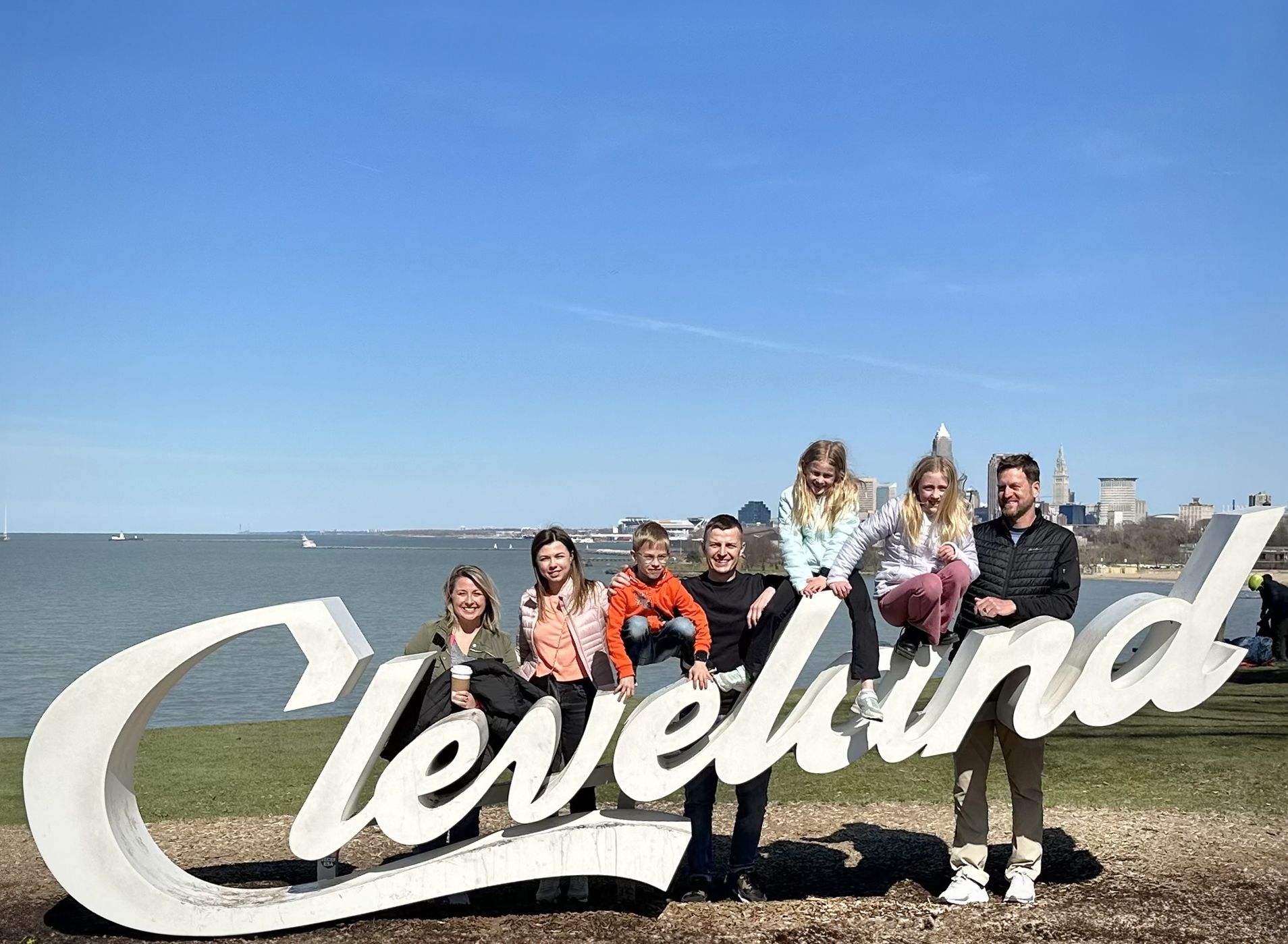
“We are so grateful for USA. We pray for Ukraine and try to help here and contribute as best as we can.”
Lived Experience and Leaps of Faith
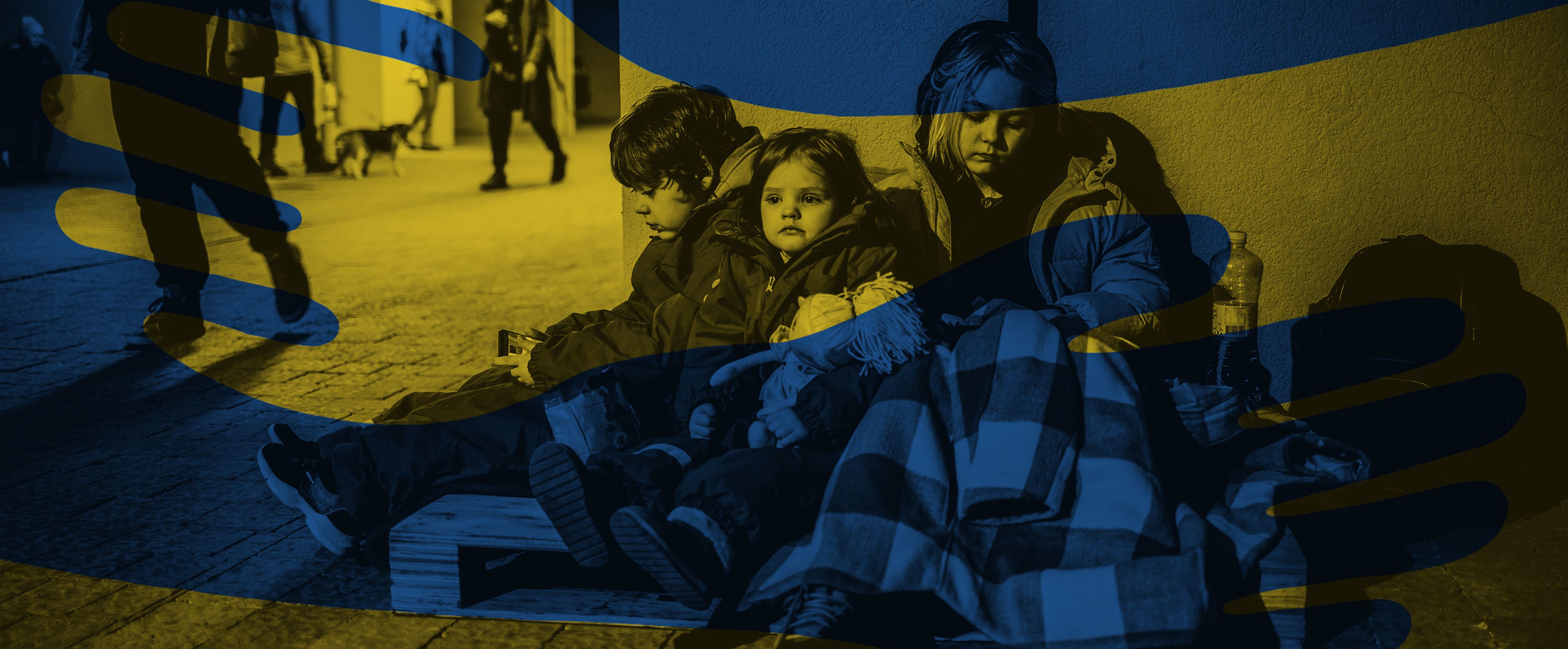
The Catholic Charities agencies working with Ukrainians each have strong existing immigration programs in cities where many Ukrainians resettled after the collapse of the Soviet Union in 1991, when Ukraine declared independence. That makes these regions logical landing places for civilians fleeing the ongoing Russian military onslaught.
The Ukrainian resettlement services offered by the various agencies all aim to provide stability and independence through workforce development and job placement programs; English language classes; assistance enrolling children in school and signing families up for Social Security and health insurance; care for emotional trauma; and other services to help families and individuals adjust to their new lives.
Catholic Charities Diocese of Cleveland, for instance, is participating in a U.S. Conference of Catholic Bishops-funded program called Welcome Circles, in which parishes are actively recruited to sponsor new families. Four cities were chosen, each with a goal of recruiting 20 parishes for 20 families. Cleveland had already recruited 15 by late spring, and four had received families.
“It’s a leap of faith, for families and parishioners,” says Heath Rosenberger, director of the agency’s migration and refugee services, which has been resettling immigrants since 1948. With a staff of 65, “our focus is on short-term and long-term goals. Self-sufficiency as soon as possible, then we help people get to where they want to be.”
Support in Northeast Ohio has been overwhelming, says Rosenberger, and not just from the longtime Ukrainian population. “Folks are really putting down roots, working hard, starting businesses. It’s been beneficial to the community.”
But even as the presence of long-settled Ukrainians can make the transition – both culturally and practically – go more smoothly for new arrivals, it doesn’t guarantee it will make it easy, for the new arrivals or the staff working with them.
Take Catholic Social Services (CSS) in Anchorage. With deep ties to the Slavic community in Alaska, the agency is working almost entirely with family sponsors for the 598 Ukrainians it resettled in FY2022. For an agency that typically resettles about 130 new arrivals per year, it was a significant increase that meant working with new partners, fostering strong connections with the Ukrainian community and creating new, innovative programming.
As the only resettlement agency in the state, the territory it covers is vast, including urban hubs like Anchorage and Juneau as well as outposts such as the Mat-Su Valley and Delta Junction, which had a population of 1,000 before receiving 100 Ukrainians last year.
A point of friction in Alaska, says Issa Spatrisano, CSS state refugee coordinator, is that the friends and families who came to Alaska in the 1990s left a very different country behind, one just emerging from longtime communist rule, and came to a state whose oil economy was booming and where jobs and housing were plentiful. Things have changed dramatically since then, in both places.
“There are very different lived experiences among families who’ve lived very different lives, from the country they left to the experience of resettlement,” says Spatrisano, who has worked in refugee services for 12 years, mostly with CSS. Buy-in from both groups is important if the program is to be successful. “In the marriage between the two worlds, we’ve found cohesion. It’s a work in progress to use the cultural strength of our communities.”
A successful partnership with the Anchorage Community Land Trust, for instance, has led to a small business startup class where ideas ranging from a bakery to construction contracting can incubate and perhaps take off.
“We’re trying to find creative approaches because people want to stay and put down roots, so we want them to understand the rules and laws governing business ownership,” says Spatrisano.
Ukrainian performers at a World Refugee Day community celebration in Anchorage, Alaska, in June.
Ukrainian performers at a World Refugee Day community celebration in Anchorage, Alaska, in June.
She’s confident the welcoming culture in Alaska and its ethos of hard work will lead to success for its newest residents, noting, for instance, that many Ukrainians are skilled in welding and construction.
“I want to talk about what refugees are doing for us. They show up here and contribute skilled labor and talent the country needs,” she says.
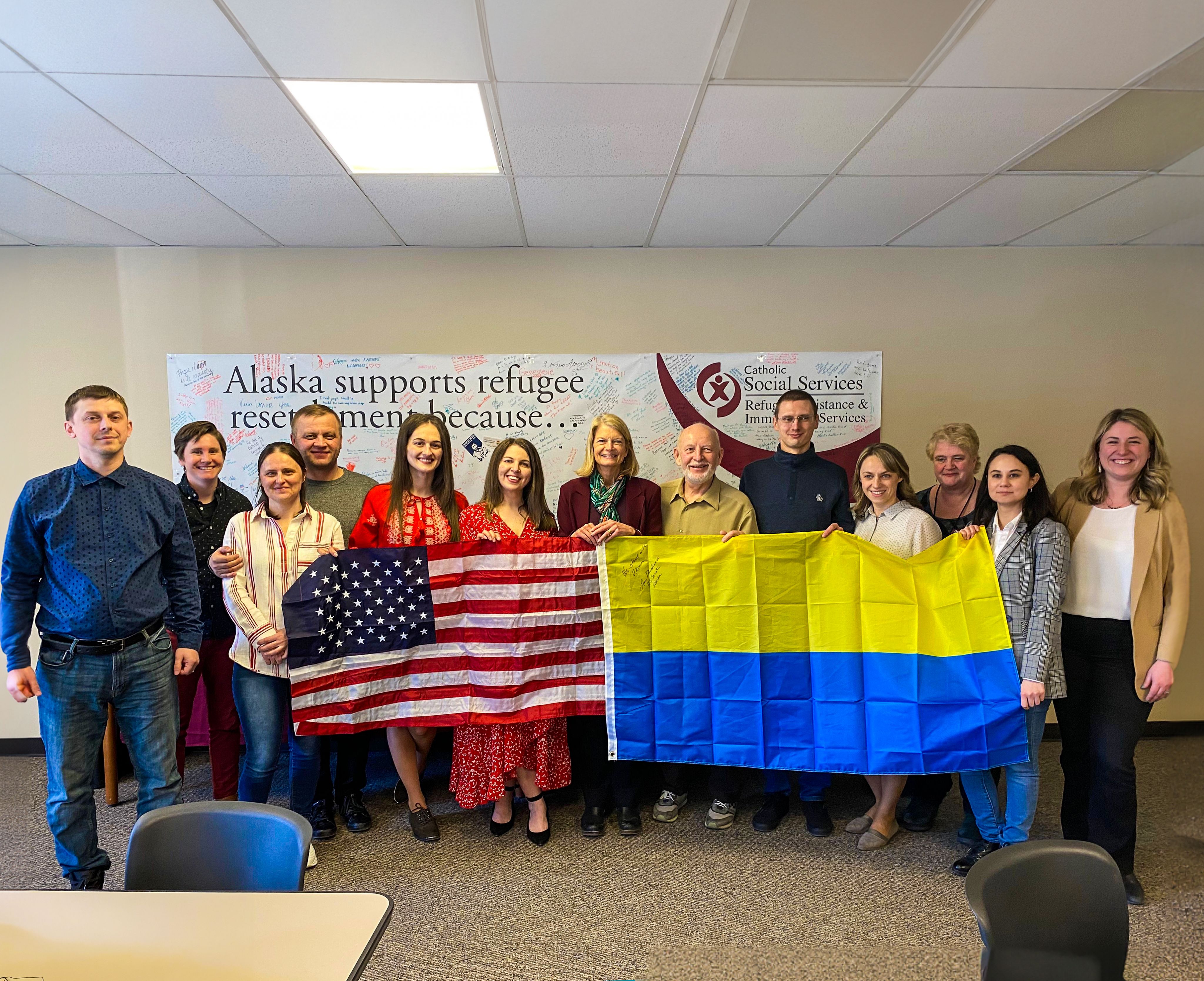
“They’re going to help build the infrastructure Alaska needs to be successful, and we’re going to watch them do it. They’re helping the state to thrive.”
Sponsorship and Uncertainty
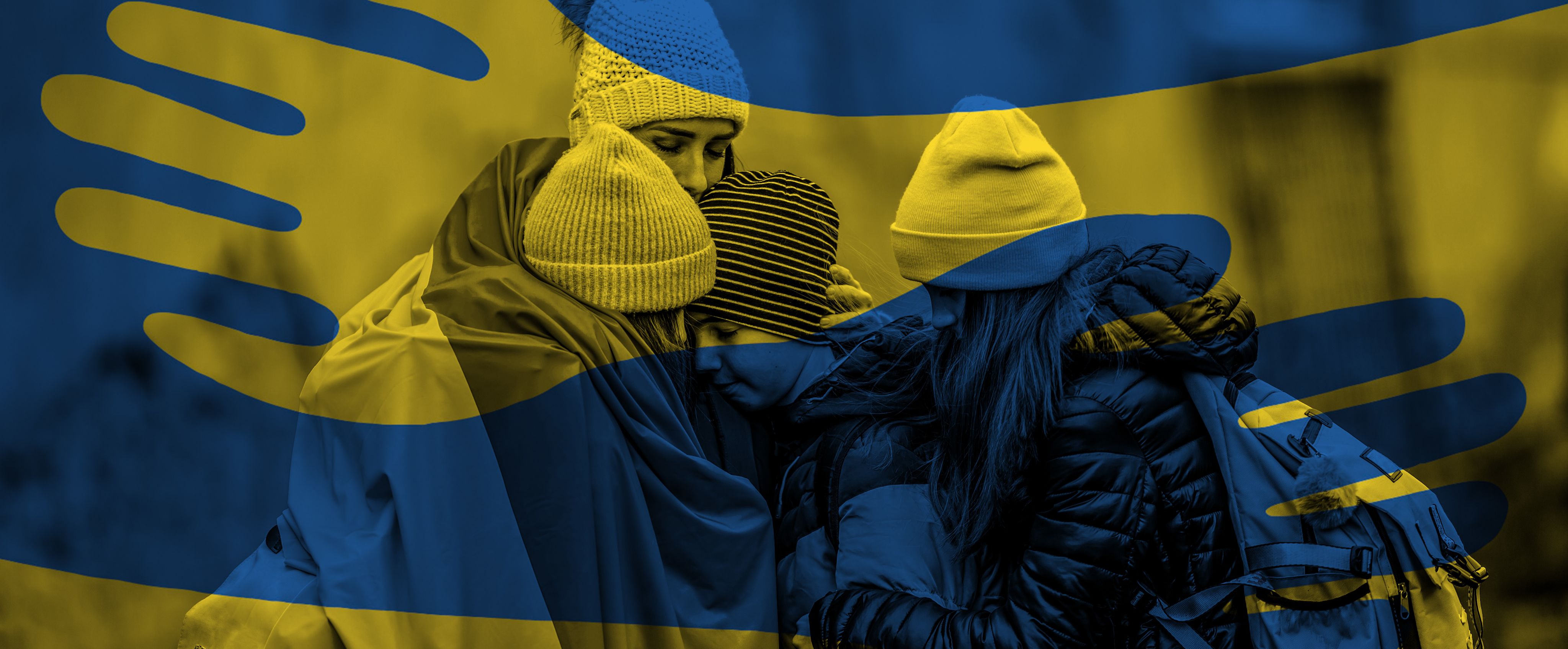
Far removed from Alaska’s subarctic climate, Catholic Charities Jacksonville has resettled more than 430 Ukrainians on Florida’s eastern coast since the war began. Its goal is to settle 675 through a matching grant, employment-based program that provides assistance with rent, utilities, job readiness – “any service that can help them to become self-sufficient,” says Hellai Norzai, director of refugee resettlement and immigration and herself an immigrant, from Afghanistan.
“They’re obviously struggling with a new life, a new culture. All refugees go through that. At least the first two years will be the hardest time of their life,” she says, noting that reliable transportation and affordable housing are in short supply in Florida, much as they are everywhere else in the country.
Some new arrivals in Jacksonville have experienced a difficulty that isn’t unique to them: American families offering to be sponsors without fully understanding the magnitude of the commitment. It’s made for more than one challenging situation, although when it works out well, it can be the start of a beautiful friendship.
That’s been the case for Anna Sviatna, who has been working as the administrative assistant for the resettlement program – helping clients with documents, acting as an interpreter – since this past spring.
She and her husband Eugene were on vacation in Sri Lanka when the war started and had to bide their time in Germany and Western Europe before they could get back to their home in Kyiv, where her mother and brother still live.
With no family or friends in the U.S., the couple accepted an offer of sponsorship from a retired couple in St. Augustine. They arrived in May 2022, met the couple’s adult children and young grandchildren at Thanksgiving, and today call the couple their “American mom and dad.”
Anna Sviatna and her husband Eugene, seated at top right, spent a happy first Thanksgiving with their "American mom and dad" and family in Jacksonville.
Anna Sviatna and her husband Eugene, seated at top right, spent a happy first Thanksgiving with their "American mom and dad" and family in Jacksonville.
“The sponsors, it’s a miracle,” says Sviatna, who notes that she and her American mom share a love of true-crime stories, which helped her to learn English. “We travel together and see each other every weekend.”
Working for Catholic Charities allows Sviatna to send money to her family in Ukraine and to save for her dream of opening an RV park.
Her colleague Dmytro Zymovskyi, from Kyiv, spent the first five months after the invasion volunteering on the border with Poland, helping Ukrainian women and children cross over. After their apartment was bombed, he, his wife and their two young sons fled, arriving in Jacksonville in September 2022.
Dmytro Zymovskyi worked for five months on the border of Ukraine and Poland, helping Ukrainian women and children flee the Russian invasion.
Dmytro Zymovskyi worked for five months on the border of Ukraine and Poland, helping Ukrainian women and children flee the Russian invasion.
In Ukraine, before his family lost everything, Zymovskyi was a high school psychology teacher with a catering business on the side. His mother remained in the country; 76 and afraid of flying, she says she was born in Ukraine and will die there. He speaks to her every day on the phone.
A client before he became an employee, Zymovskyi learned about Catholic Charities from an American friend from Gainesville who was volunteering in Ukraine. His family received rental and cash assistance and help with documents, and Zymovskyi now finds himself helping other Ukrainians with the same services as a refugee specialist.
What comes next is not clear. On the one hand, he loves Ukraine and his mother is there. On the other, his sons, 5 and 8, are settling into a rhythm of life and his wife is looking for a job.
“I worry about it. I’m sure I will stay in Jacksonville. My family is tired to move from place to place, and it will be calm here,” Zymovskyi says. But he longs to see his mother and for things to be okay back home.
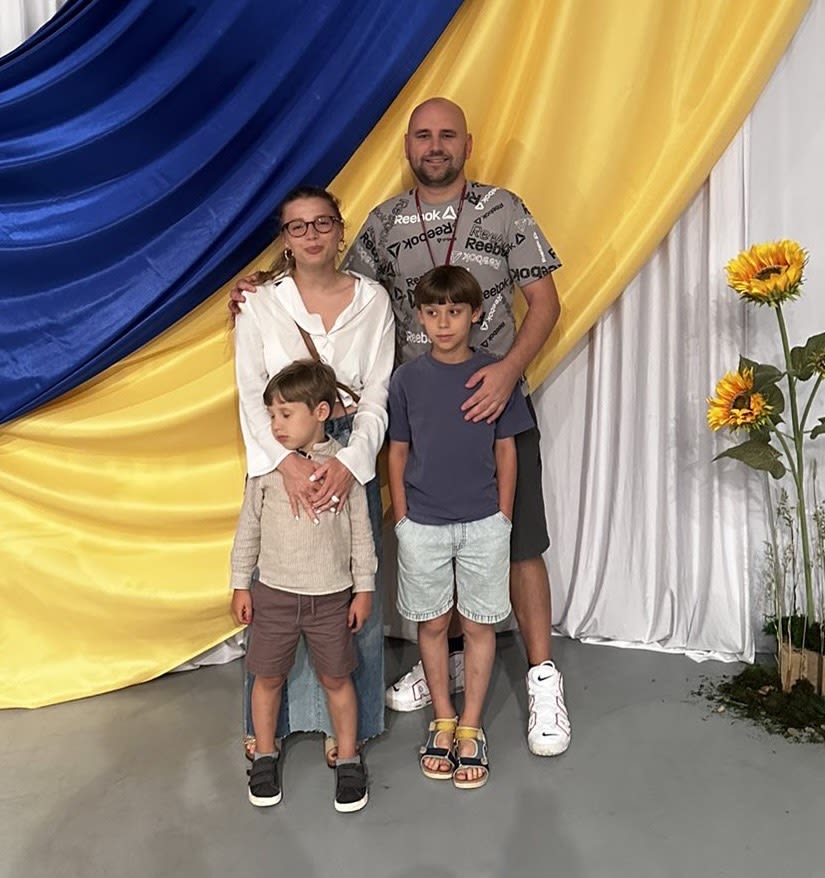
“I’m not sure what the future will be. It’s the general position, uncertainty.”
Hearts and Tears
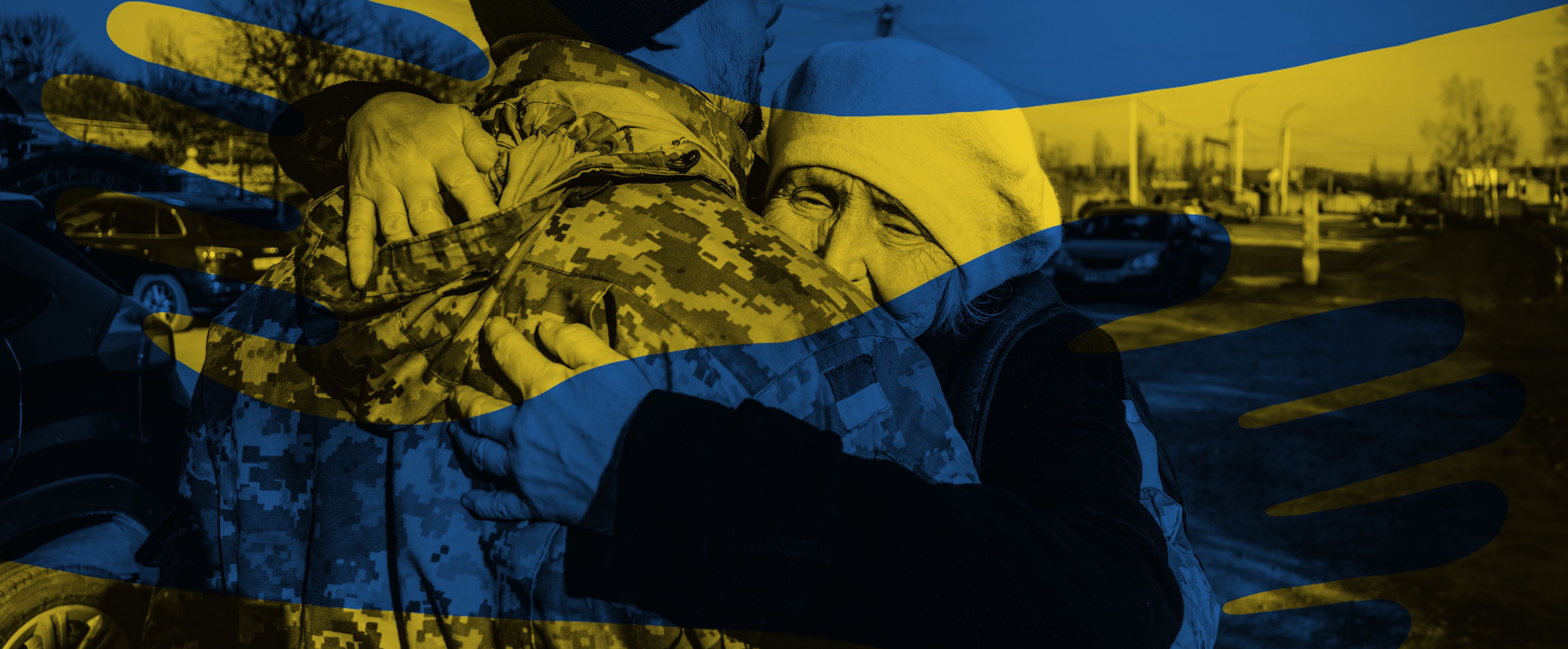
“I don’t know how people who come to the U.S. under U4U and who don’t have relatives or friends deal with accommodations,” says Kateryna Huretska, who has lived in New York since 2017, when she arrived as an au pair on an exchange program. She’s since married an American and given birth to her first child, but her heart – and family – were in Ukraine when the war began.
Kateryna Huretska in New York with her grandfather, who is blind and fled Kherson, Ukraine, after the war started. Her grandmother, who uses a wheelchair, and Huretska's parents left with him. The journey took four days through Russia, Latvia and Poland.
Kateryna Huretska in New York with her grandfather, who is blind and fled Kherson, Ukraine, after the war started. Her grandmother, who uses a wheelchair, and Huretska's parents left with him. The journey took four days through Russia, Latvia and Poland.
Huretska turned to Catholic Charities Archdiocese of New York (CCNY) to help resettle her parents and grandparents. She applied twice as their sponsor and was twice denied, even though her family qualified for the program. Then a friend recommended she reach out to CCNY for assistance; the third time was the charm.
“I feel like such organizations as Catholic Charities are the most important resource for those people,” she says, noting how difficult the paperwork is even for someone accustomed to life in the States. “I would not do even a half of that on my own.”
Huretska now works for CAMBA Inc., a Brooklyn-based social service agency that is helping to resettle Ukrainians, although her work is mostly with French speakers, owing to her French language skills. She also speaks Ukrainian, English, Russian and some Polish.
While all of her clients are immigrants, Huretska has realized a difference that might not have occurred to her when she left Ukraine six years ago. For many immigrants, and certainly for Ukrainians today, “Because of a war, they had to leave. It’s not like they wanted to go,” she says. “They were going with tears.”
Iryna Dovbnya is another Ukrainian who had already been living outside of Ukraine, since 2021. Previously a religious sister who did global fundraising for her congregation, she was most recently working as a religion teacher at a Catholic school in New Jersey. Her parish began receiving Ukrainians, and she found her way to CCNY, where she now directs the Ukrainian response program. Huretska was one of her clients.
Dovbnya's job is similar to that of her peers at Catholic Charities agencies across the country who are working with Ukrainians – helping with documentation, benefits, English classes, financial assistance, health insurance, jobs, getting children enrolled in school. Over 22,000 Ukrainians had arrived in New York City by spring 2023, and CCNY has aided more than 1,200 of them.
“Iryna brings not only professional experience, she’s a very emotionally perceptive person,” says Kelly Agnew-Barajas, director of refugee resettlement at CCNY. The program has staffed up to include 22 people, who both provide services and may also be in need of them, having themselves suffered the trauma of war or of seeing their family experience it. “I’m really concerned for my staff. Our staff are the same people that we are serving.”
The addition of a Ukrainian health coordinator will help to make the program and the network they’re building for clients more sustainable, she says.
The work is exhausting and seemingly never-ending, but for Dovbnya and other Ukrainians, it is also absolutely necessary.
“I call my job my mission. Because first of all, it helps me to co-feel with my compatriots, from the bottom of my heart. I’m not only doing it because of my duties, my responsibilities. I want to do all my best, not to omit any opportunity to help,” she says.
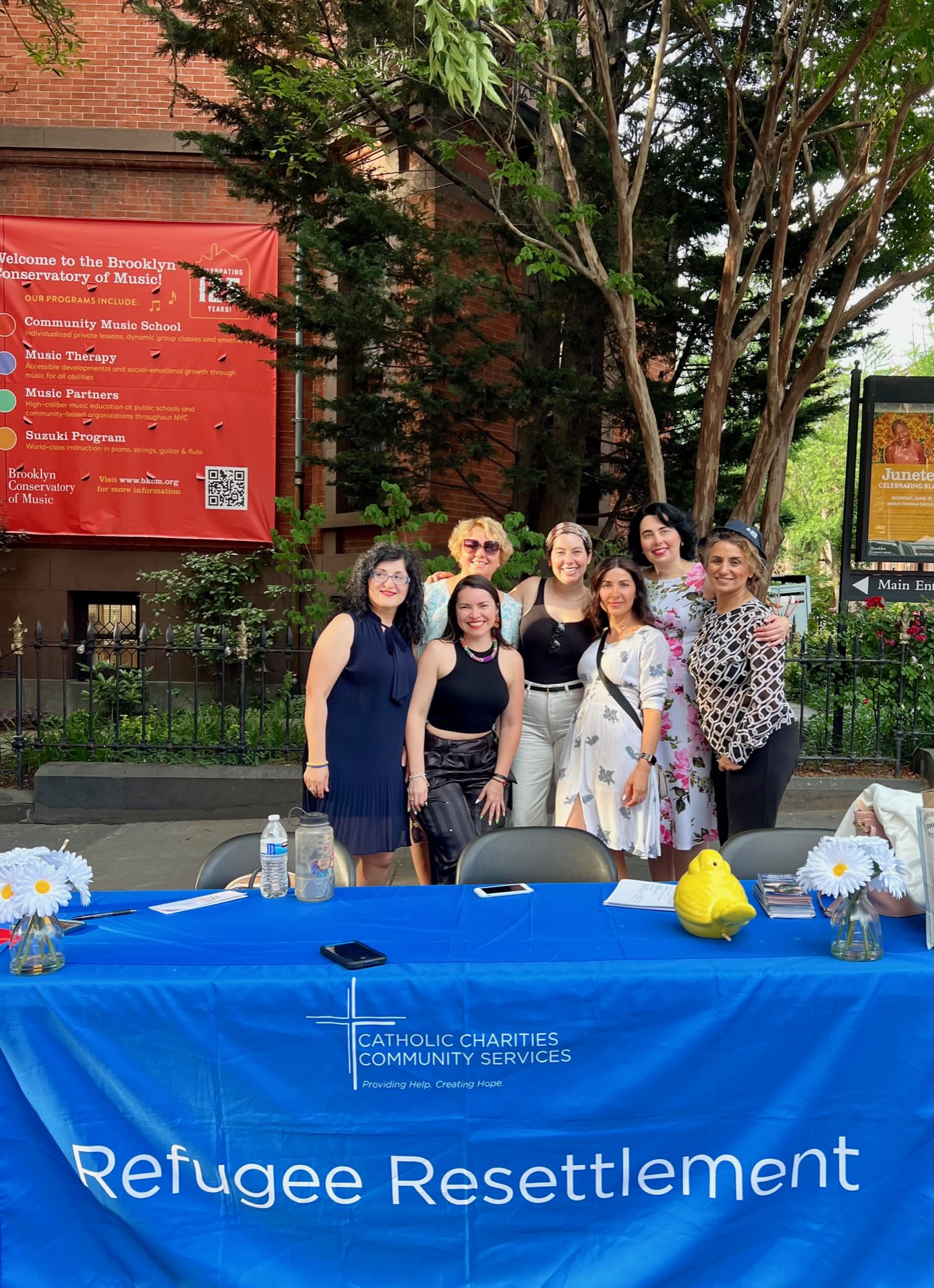
“I think every helped Ukrainian will be a kind of big help, not only for my country, but also for this country, where they are now living.”
Solidarity Visit to Ukraine
Sister Donna Markham OP, Ph.D., the president and CEO of Catholic Charities USA, shares her experiences with the Ukrainian people and discusses their resilience and faith in the face of unimaginable tragedy.
CATHOLIC CHARITIES USA
2050 Ballenger Ave, Suite 400, Alexandria, VA 22314
703-549-1390 | catholiccharitiesusa.org
© 2024 Catholic Charities USA. All rights reserved.
Terms of Service
Privacy Policy
CCUSA is a 501(c)(3) non-profit organization.
Federal Tax ID Number 53-0196620

